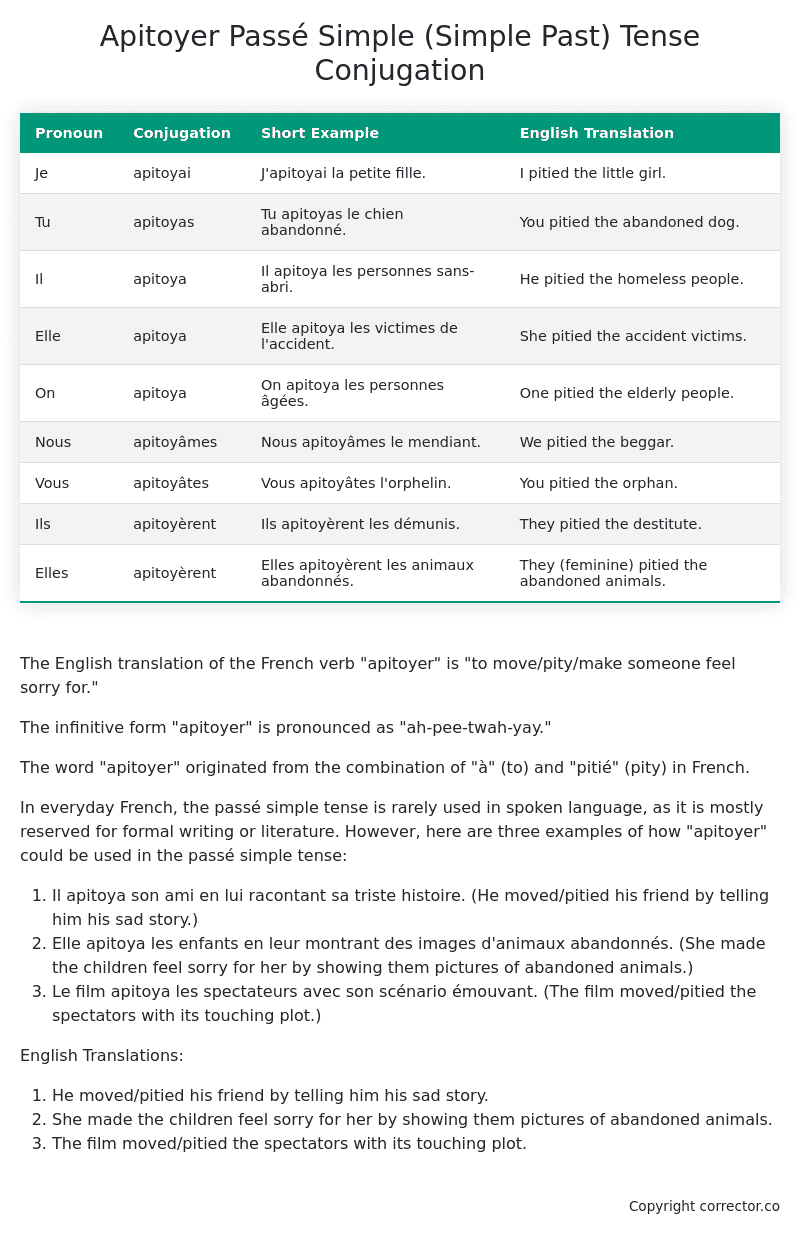Passé Simple (Simple Past) Tense Conjugation of the French Verb apitoyer
Introduction to the verb apitoyer
The English translation of the French verb “apitoyer” is “to move/pity/make someone feel sorry for.”
The infinitive form “apitoyer” is pronounced as “ah-pee-twah-yay.”
The word “apitoyer” originated from the combination of “à” (to) and “pitié” (pity) in French.
In everyday French, the passé simple tense is rarely used in spoken language, as it is mostly reserved for formal writing or literature. However, here are three examples of how “apitoyer” could be used in the passé simple tense:
- Il apitoya son ami en lui racontant sa triste histoire. (He moved/pitied his friend by telling him his sad story.)
- Elle apitoya les enfants en leur montrant des images d’animaux abandonnés. (She made the children feel sorry for her by showing them pictures of abandoned animals.)
- Le film apitoya les spectateurs avec son scénario émouvant. (The film moved/pitied the spectators with its touching plot.)
English Translations:
- He moved/pitied his friend by telling him his sad story.
- She made the children feel sorry for her by showing them pictures of abandoned animals.
- The film moved/pitied the spectators with its touching plot.
Table of the Passé Simple (Simple Past) Tense Conjugation of apitoyer
| Pronoun | Conjugation | Short Example | English Translation |
|---|---|---|---|
| Je | apitoyai | J’apitoyai la petite fille. | I pitied the little girl. |
| Tu | apitoyas | Tu apitoyas le chien abandonné. | You pitied the abandoned dog. |
| Il | apitoya | Il apitoya les personnes sans-abri. | He pitied the homeless people. |
| Elle | apitoya | Elle apitoya les victimes de l’accident. | She pitied the accident victims. |
| On | apitoya | On apitoya les personnes âgées. | One pitied the elderly people. |
| Nous | apitoyâmes | Nous apitoyâmes le mendiant. | We pitied the beggar. |
| Vous | apitoyâtes | Vous apitoyâtes l’orphelin. | You pitied the orphan. |
| Ils | apitoyèrent | Ils apitoyèrent les démunis. | They pitied the destitute. |
| Elles | apitoyèrent | Elles apitoyèrent les animaux abandonnés. | They (feminine) pitied the abandoned animals. |
Other Conjugations for Apitoyer.
Le Present (Present Tense) Conjugation of the French Verb apitoyer
Imparfait (Imperfect) Tense Conjugation of the French Verb apitoyer
Passé Simple (Simple Past) Tense Conjugation of the French Verb apitoyer (You’re reading it right now!)
Passé Composé (Present Perfect) Tense Conjugation of the French Verb apitoyer
Futur Simple (Simple Future) Tense Conjugation of the French Verb apitoyer
Futur Proche (Near Future) Tense Conjugation of the French Verb apitoyer
Plus-que-parfait (Pluperfect) Tense Conjugation of the French Verb apitoyer
Passé Antérieur (Past Anterior) Tense Conjugation of the French Verb apitoyer
Futur Antérieur (Future Anterior) Tense Conjugation of the French Verb apitoyer
Subjonctif Présent (Subjunctive Present) Tense Conjugation of the French Verb apitoyer
Subjonctif Passé (Subjunctive Past) Tense Conjugation of the French Verb apitoyer
Subjonctif Imparfait (Subjunctive Imperfect) Tense Conjugation of the French Verb apitoyer
Subjonctif Plus-que-parfait (Subjunctive Pluperfect) Tense Conjugation of the French Verb apitoyer
Conditionnel Présent (Conditional Present) Tense Conjugation of the French Verb apitoyer
Conditionnel Passé (Conditional Past) Tense Conjugation of the French Verb apitoyer
Conditionnel Passé II (Conditional Past II) Tense Conjugation of the French Verb apitoyer
L’impératif Présent (Imperative Present) Tense Conjugation of the French Verb apitoyer
L’impératif Passé (Imperative Past) Tense Conjugation of the French Verb apitoyer
L’infinitif Présent (Infinitive Present) Tense Conjugation of the French Verb apitoyer
L’infinitif Passé (Infinitive Past) Tense Conjugation of the French Verb apitoyer
Le Participe Présent (Present Participle) Tense Conjugation of the French Verb apitoyer
Le Participe Passé (Past Participle) Tense Conjugation of the French Verb apitoyer
Struggling with French verbs or the language in general? Why not use our free French Grammar Checker – no registration required!
Get a FREE Download Study Sheet of this Conjugation 🔥
Simply right click the image below, click “save image” and get your free reference for the apitoyer Passé Simple tense conjugation!

Apitoyer – About the French Passé Simple (Simple Past) Tense
Formation
Usage
Narration
Historical Context
Interactions with other tenses
Passé Composé
Imparfait
Conditional and Subjunctive
Summary
I hope you enjoyed this article on the verb apitoyer. Still in a learning mood? Check out another TOTALLY random French verb conjugation!


